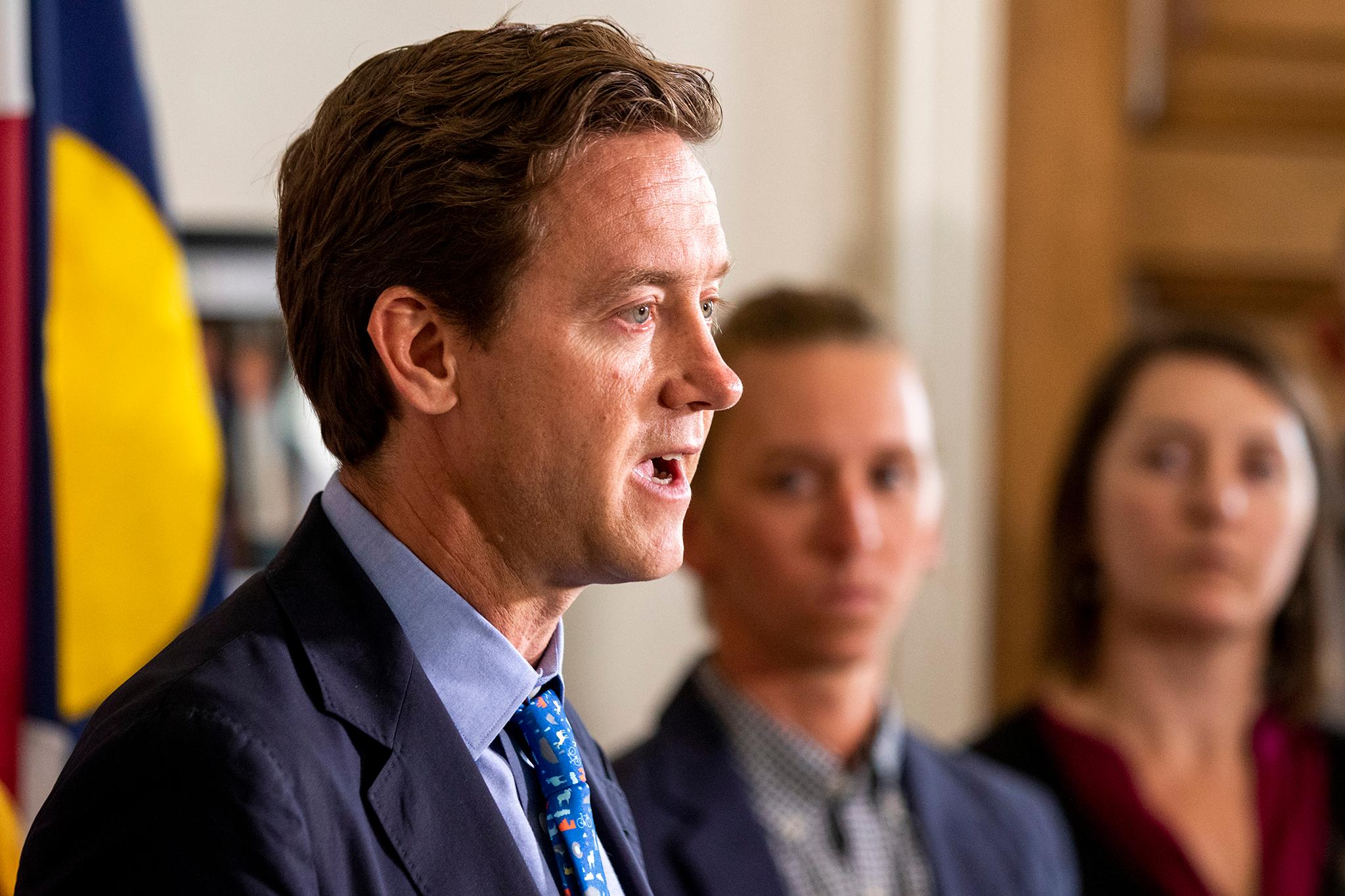The same day city workers under Mike Johnston's administration forced people from an encampment at 17th Ave. and Logan St. over safety issues after a shooting at the site, the mayor released a map of locations where the city plans to build micro communities to temporarily house people living on the street as they wait for more permanent housing.
Thursday's sweep included offers of services, mental-health support but not a direct pathway to housing for most residents. Housing currently does not exist, though non-congregate shelters do.
Residents Denverite spoke to were not pleased with the sweep.
Nicole Barbour said she's been living at the encampment and helping keep it clean while residents waited for the city to deliver on its promise of affordable housing.
"I feel like they made us comfortable and said, 'Hey, this is gonna be cool. We're gonna help you get housing. You can stay here. We're all for you. Just keep up the area cleaning. We were doing that. And then all of a sudden, boom, bam, bam, 'You gotta go.' That was just like a slap in the face."

Johnston has said in the past he would not conduct sweeps unless they came with an offer of housing.
That didn't happen for most during the first sweep of his administration on Aug. 4 or the one today. Johnston said after the first that he would do forced cleanups when safety and public health issues necessitate it and when people are camping on private property or in the right of way. He acknowledges the strategy of sweeps without housing is an ineffective solution to homelessness.
Johnston has promised to end homelessness in the city in four years and shelter 1,000 people off the streets by the end of December as part of a state of emergency he has declared and City Council has renewed.
"We believe we now have a path to deliver a thousand units of housing that will help meet the goal to get 1,000 people off the streets and into housing," Johnston said.
If utilities are functioning at all the sites announced Thursday, the city has enough land to build the 1,000 tiny homes, the mayor said.
Knowing they might not all work out, he's also in talks with private land developers about using their properties, to ensure the tiny home villages are spread throughout the city. He said the landowners are negotiating in "good faith," but he's not ready to make any other announcements.

"The private landowner community has been very cooperative and collaborative," he said.
Multiple districts, including whiter and wealthier District 5 represented by City Councilmember Amanda Sawyer, who has been the most vocal critic on the dais of Johnston's State of Emergency over homelessness, do not have current sites, though he says they will be coming and he's in productive talks with Sawyer.
Denverite reached out to Sawyer for comment but did not immediately hear back. We will update this story when we do.
The list of sites Johnston released Thursday included a mix of both publicly and privately owned land spread across eight of 11 City Council districts.
The current list of sites includes:
- 1498 N. Irving St. in District 3
- 5500 E. Yale Ave. in District 4
- 1380 S. Birch. St. in District 6
- 2301 S. Santa Fe Dr. in District 7
- 950 W. Alameda Ave. in District 7
- 12033 E. 38th Ave. in District 8
- 4595 N. Quebec St. in District 8
- 3700 Galapago St. in District 9
- 1375 N. Elati St. in District 10
- 1199 N. Bannock St. in District 10
- 5000 Tower Rd. in District 11
Here's a map of the locations:
The city announced in July that it was close to leasing a site at 4595 N. Quebec St. -- a hotel with 193 units -- from the Denver Housing Authority. And the Stay Inn, located at 12033 E. 38th Ave. was purchased for $9 million by former mayor Michael Hancock's administration, though the deal to secure 95 rooms was closed under Johnston.
Johnston has spoken to more than 3,000 residents at public townhalls about homelessness.
He has planned another 14 conversations -- including two Thursday night -- where he has been discussing issues of unsheltered homelessness, the housing crisis, crime, drug treatment and mental health.
Neighbors have included business owners and activists. They span the gamut from those who believe unhoused residents who use drugs should be arrested and jailed with increased sentences to those who believe police should have no role in resolving homelessness and that a housing-first model -- not temporary housing -- should be Johnston's priority.

"In each of those town halls, we'll be having conversations about these sites, answering questions. [We're] available for information that any residents or neighbors may have."
The administration also submitted a bill to City Council to spend $7 million to fund 200 pallet homes and has reached out to contractors to submit proposals to lead the work.
Johnston expects the city will make progress on hiring within the next two weeks.
"This means we have access to sites," Johnston said. "We have access to the construction pipeline of homes that we'll need. We'll continue to have the community engagement process to help land these sites and these units to prepare to get people moved off of the streets and into housing."

But for residents swept from their tents on Logan St., the pace isn't fast enough and some feel betrayed by Johnston, who said people could stay in their encampments if they kept it clean.
"They're kind of wishy-wishy-washy," Barbour said. "It kind of throws you off. You're saying one thing, but then you're saying another thing."
Residents can find a full list of upcoming town halls to engage with Johnston right here.
Kevin Beaty and Obed Manuel contributed reporting to this story.











